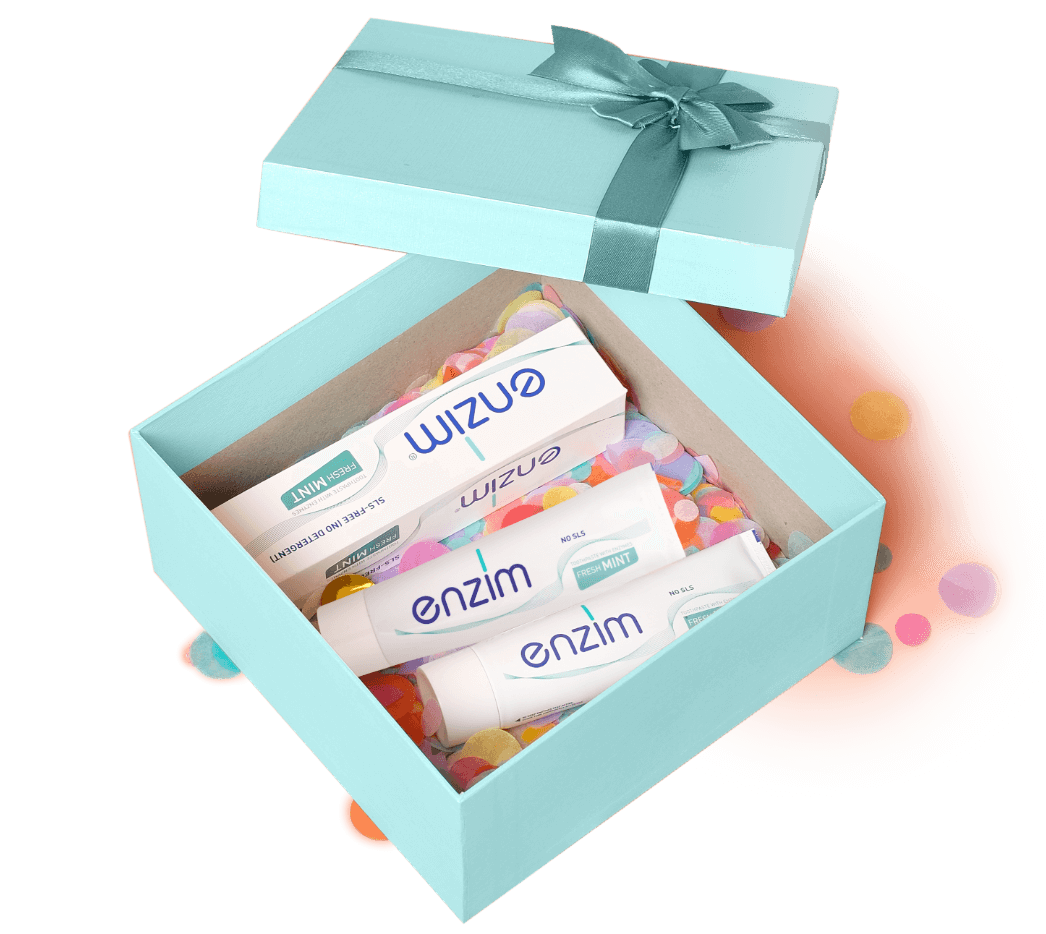Tooth Sensitivity Triggered by Diet? Here's What You Didn't Know

Tooth Sensitivity Triggered by Diet? Here's What You Didn't Know - Enzim Singapore

That sharp, sudden tooth pain you feel with ice cream or hot tea might have a connection to your daily diet. This discomfort, often described as a toothache or teeth pain, occurs when your tooth's enamel erodes, exposing the dentine layer underneath. This layer contains hundreds of tiny water-filled tubes that connect to inner nerves and trigger that uncomfortable sensation, a condition known as dentin hypersensitivity. If you're wondering "why do my teeth hurt" or "why are my teeth sensitive all of a sudden," your diet might be the culprit. Some people even experience that their tooth hurts when they put pressure on it, which is another common symptom of tooth sensitivity.
What Causes Sensitive Teeth? Your Diet Might Be the Answer
Your diet affects your teeth more than you realize. Bacteria in your mouth interact with sugar to create acids that damage your protective enamel. Acidic foods and beverages steadily break down this vital barrier. Lack of essential nutrients, particularly vitamins C and D, can cause bleeding gums and weaken your enamel. These issues make your teeth more sensitive and can lead to various toothache causes.
Relief starts with recognizing these hidden dietary triggers. In this piece, we'll look at how your eating habits could cause discomfort and explore what causes sensitive teeth. Simple changes can make a difference, and quality products like Enzim Toothpaste, a specialized toothpaste for sensitive teeth, help protect your teeth from sensitivity effectively.
Why do my teeth hurt & How Diet Affects Tooth Sensitivity
Your daily diet is a vital part of dental health, especially when you have tooth sensitivity. The foods and drinks you consume can directly affect the protective enamel coating your teeth and contribute to why your teeth hurt.
Tooth sensitivity starts with enamel erosion that happens slowly through your eating habits. Your tooth enamel dissolves when you regularly eat acidic foods. This exposes the dentin beneath and triggers that uncomfortable zingy feeling. The exposure lets temperature extremes and sweet foods reach the nerve endings inside your teeth, often causing teeth pain when biting or chewing. You might even find that your tooth hurts when you put pressure on it, a common symptom of tooth sensitivity.
Acidic culprits to watch out for include:
-
Citrus fruits and juices (oranges, lemons)
-
Tomatoes and tomato-based products
-
Carbonated drinks, including diet versions
-
Wine and alcoholic beverages
-
Pickled foods
-
Coffee and tea
How Sugary Foods Damage Enamel and Lead to Sensitive Teeth
Most carbonated soft drinks have damaging citric and phosphoric acids. Sugary treats make bacteria release acids that attack tooth enamel. These acids can lower your mouth's pH to 5.5 or below, which creates perfect conditions for enamel erosion and plaque buildup.
How to Stop Sensitive Teeth Pain Immediately
Frequent snacking on sugary foods does more harm than total sugar consumption. Your mouth's pH takes about 30 minutes to recover after each sugar intake. Repeated snacking throughout the day keeps your teeth under acid attack longer, leading to tooth wear and increased sensitivity.
Teeth Pain When Drinking Cold Water and Other Triggers
Temperature extremes bother sensitive teeth. Hot soups, ice cream, and chilled drinks can cause sharp pain when they touch exposed dentin, a phenomenon known as hot and cold sensitivity. Many people experience teeth pain when drinking cold water. Hard sweets and chewy candies might hurt too. They often get stuck in open cavities and under gums, and you might find that your tooth hurts when you put pressure on it.
Sensitive Teeth Remedy Through Food Choices and Toothpaste
The good news is some foods protect your teeth. Cheese has cariostatic properties. The calcium, phosphorus and casein in milk help stop tooth decay. Wholemeal foods need more chewing, which makes your mouth produce protective saliva.
If you already have sensitivity, Enzim Toothpaste will be your best mate! Its special formula, acting as a desensitizing toothpaste, targets the mechanisms of sensitivity while making your remaining enamel stronger. You'll soon enjoy your favorite foods without wincing when you combine it with smart food choices and proper brushing technique using a soft-bristled toothbrush.
Hidden Dietary Triggers You Might Be Overlooking
Why Are My Teeth Sensitive All of a Sudden?
Your tooth sensitivity might have surprising dietary triggers beyond acidic fruits and sugary sweets. Many people don't realize these hidden causes, which can explain why their teeth are sensitive all of a sudden.
How to Stop Sensitive Teeth Pain Immediately with Smart Eating
Snacking patterns play a crucial role here. Small frequent meals throughout the day create an almost constant acidic environment in your mouth. Acid levels rise with each bite you take and promote tooth enamel demineralisation. Your saliva helps neutralize these acids naturally. However, constant snacking doesn't give your teeth enough time to recover and remineralise.
Teeth Pain When Drinking Cold Water Isn’t the Only Warning Sign
Many people choose flavored water thinking it's healthy. These drinks often contain citric acid that wears down enamel gradually. Even the sugar-free versions can harm your teeth through their acidity. You can protect your teeth by using a straw with these drinks to minimize contact with your teeth.
Sensitive Teeth Remedy Starts with What You Drink
Carbonated drinks, including sparkling water, create carbonic acid with pH levels dropping to 2.5. This level sits nowhere near the critical pH of 5.5 where enamel starts dissolving. These fizzy beverages also lower your mouth's pH, creating perfect conditions that lead to sensitivity and exposed roots.
Traditional dried fruits without added sugar don't deserve their bad reputation. In stark comparison to this popular belief, they aren't necessarily bad for your teeth. Their chewy texture actually helps produce more saliva, which neutralizes acids.
Sensitive Gums and Calcium Deficiency: The Overlooked Link
Low calcium intake creates another hidden problem. Your body stores 99% of its calcium in bones and teeth. Not getting enough calcium forces your body to use these reserves, which weakens teeth and increases sensitivity. This can also contribute to gum recession, which exposes the sensitive root surfaces of your teeth.
Back Teeth Pain and Hidden Causes
Some people might experience back teeth pain due to these dietary factors. The molars are often more susceptible to decay and sensitivity because of their location and the difficulty in cleaning them thoroughly. Additionally, a worn filling in your back teeth can lead to increased sensitivity and discomfort, especially when you put pressure on it.
Enzim Toothpaste offers excellent protection to people with sensitive teeth! Its formula targets sensitivity directly while making your remaining enamel stronger, providing an effective sensitive teeth treatment.
Note that timing makes a difference. Let 30 minutes pass after eating acidic foods before you brush. This prevents damage to softened enamel. This simple change combined with smart food choices can reduce your tooth sensitivity by a lot.
Foods That Help and the Best Toothpaste to Use
How to Stop Sensitive Teeth Pain Immediately with the Right Food and Toothpaste
Want relief from sensitive teeth? Your food choices matter as much as your toothbrush. Here are some sensitive teeth remedies and tips on how to stop sensitive teeth pain immediately.
Sensitive Gums? Start with Calcium and Natural Cleansers
Dairy products act like superheroes for tooth sensitivity. Cheese, milk and yogurt rebuild tooth enamel with their calcium and phosphorus content. Dairy's casein protein forms a protective layer on teeth that helps prevent cavities and decay. Hard cheeses like cheddar boost saliva production to wash away harmful bacteria and acids naturally.
Spinach, kale and broccoli pack calcium and vitamin K - vital nutrients for strong teeth and bones. Research proves that these greens' nitrate content eliminates harmful bacteria and balances oral acidity. This creates an ideal environment in your mouth.
Your plate needs crunchy fruits and vegetables too. Apples, carrots and celery serve as nature's toothbrushes. They generate saliva and clean away bacteria and plaque while you chew. These fibrous foods make you chew more, which increases your mouth's blood flow and strengthens your gums.
Water serves as the ultimate natural cleanser. It clears food particles and neutralizes your mouth's acid to prevent enamel erosion. Regular water intake throughout the day combined with good oral hygiene creates conditions where sensitive teeth can heal.
Try Enzim Toothpaste: A Trusted Sensitive Teeth Remedy
Try Enzim Toothpaste to prevent tooth sensitivity and protect your enamel. The SLS-free formula makes it gentle on sensitive gums and ideal for people prone to mouth ulcers. Unlike foamy alternatives that can irritate and reduce saliva quality, Enzim's enzyme-rich formula improves your mouth's natural defenses. This toothpaste, combined with dietary changes, can be an effective sensitive teeth remedy, providing relief within two weeks.
Sensitive Teeth Treatment That Targets Enamel and Nerve Protection
Quality sensitivity toothpaste should contain potassium nitrate or stannous fluoride to seal exposed dentinal tubules. The right toothpaste combined with dietary changes can substantially reduce discomfort within two weeks. For those looking for additional protection, dental sealants can be applied to the chewing surfaces of back teeth to prevent decay and reduce sensitivity.
In some cases, dental adhesives might be recommended by your dentist to protect exposed root surfaces and reduce sensitivity. These products can provide a temporary barrier against sensitivity triggers, especially helpful for those who experience pain when they put pressure on their tooth.
Conclusion
Your favorite foods and drinks can become painful experiences due to tooth sensitivity. Your daily diet plays a vital role in preventing or causing that sharp, uncomfortable zingy feeling in your teeth. If you're still wondering "why does my tooth hurt," it's important to consider your dietary habits and oral hygiene routine.
Acidic foods, sugary treats, and carbonated drinks damage your protective enamel. Your snacking habits create constant acid attacks on your teeth and leave little time to recover. Hidden triggers like flavored waters and calcium deficiencies might cause problems without your knowledge, leading to sudden tooth sensitivity.
Simple changes can make a big difference. Cheese, leafy greens, and crunchy vegetables help strengthen your teeth and reduce sensitivity while tasting great. The timing of your brushing matters too. Your enamel stays protected when you wait 30 minutes after acidic foods before brushing.
The right toothpaste makes all the difference among other dietary adjustments. Enzim Toothpaste's gentle, SLS-free formula works with your mouth's natural defenses, making it ideal for sensitive teeth. You can prevent tooth sensitivity and enjoy your favorite foods without pain by using Enzim Toothpaste.
Small, consistent changes give the best results. Your teeth stay protected when you sip through a straw or add more calcium-rich foods to your meals. These simple habits keep that uncomfortable sensitivity away. Your next ice cream outing or hot cup of tea will be much more enjoyable!
Remember, if you experience persistent tooth pain or sensitivity, it's essential to consult with a dentist. They can identify underlying issues like teeth grinding, cracked teeth, or gum disease that may be contributing to your discomfort. In some cases, dental procedures or treatments like a mouthguard for nighttime teeth grinding might be necessary to address the root cause of your sensitivity.
For severe cases of sensitivity or extensive enamel loss, your dentist might recommend more advanced treatments. These could include root canal therapy for teeth with irreversible pulp damage, gum grafts to cover exposed root surfaces, or dental bonding to protect sensitive areas. A gum graft procedure can be particularly effective for those with receding gums, which often contribute to tooth sensitivity. Some people might also consider teeth whitening, but it's important to address any sensitivity issues before undergoing this cosmetic procedure.
It's also worth noting that tooth sensitivity can sometimes be a symptom of other dental issues. For instance, temporomandibular disorder (TMD) can cause pain that mimics tooth sensitivity. If you're experiencing jaw pain along with tooth sensitivity, or if your tooth hurts when you put pressure on it, it's crucial to get a proper diagnosis from your dentist.
By understanding the connection between your diet and tooth sensitivity, and taking proactive steps to protect your teeth, you can maintain a healthy, pain-free smile for years to come. Remember, your oral health is an integral part of your overall well-being, so treat your teeth with the care they deserve!



